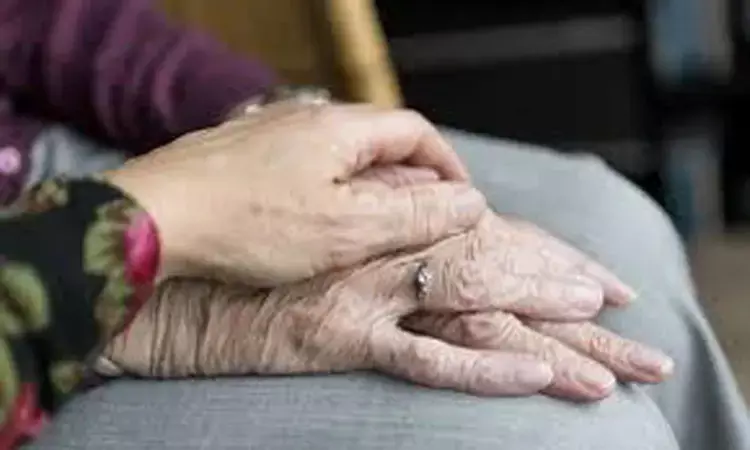- Home
- Medical news & Guidelines
- Anesthesiology
- Cardiology and CTVS
- Critical Care
- Dentistry
- Dermatology
- Diabetes and Endocrinology
- ENT
- Gastroenterology
- Medicine
- Nephrology
- Neurology
- Obstretics-Gynaecology
- Oncology
- Ophthalmology
- Orthopaedics
- Pediatrics-Neonatology
- Psychiatry
- Pulmonology
- Radiology
- Surgery
- Urology
- Laboratory Medicine
- Diet
- Nursing
- Paramedical
- Physiotherapy
- Health news
- Fact Check
- Bone Health Fact Check
- Brain Health Fact Check
- Cancer Related Fact Check
- Child Care Fact Check
- Dental and oral health fact check
- Diabetes and metabolic health fact check
- Diet and Nutrition Fact Check
- Eye and ENT Care Fact Check
- Fitness fact check
- Gut health fact check
- Heart health fact check
- Kidney health fact check
- Medical education fact check
- Men's health fact check
- Respiratory fact check
- Skin and hair care fact check
- Vaccine and Immunization fact check
- Women's health fact check
- AYUSH
- State News
- Andaman and Nicobar Islands
- Andhra Pradesh
- Arunachal Pradesh
- Assam
- Bihar
- Chandigarh
- Chattisgarh
- Dadra and Nagar Haveli
- Daman and Diu
- Delhi
- Goa
- Gujarat
- Haryana
- Himachal Pradesh
- Jammu & Kashmir
- Jharkhand
- Karnataka
- Kerala
- Ladakh
- Lakshadweep
- Madhya Pradesh
- Maharashtra
- Manipur
- Meghalaya
- Mizoram
- Nagaland
- Odisha
- Puducherry
- Punjab
- Rajasthan
- Sikkim
- Tamil Nadu
- Telangana
- Tripura
- Uttar Pradesh
- Uttrakhand
- West Bengal
- Medical Education
- Industry
Risk of death for men 60% higher than for women in study of 28 countries

A large study of people in 28 countries found men aged 50 and over had a 60% greater risk of death than women, partly explained by heavier rates of smoking and heart disease in men, although the gap varied across countries, according to new research in CMAJ (Canadian Medical Association Journal) .
"Many studies have examined the potential impact of social, behavioural and biological factors on sex differences in mortality, but few have been able to investigate potential variation across countries," writes Dr. Yu-Tzu Wu, Institute of Psychiatry, Psychology and Neuroscience, King's College London, and Population Health Sciences Institute, Newcastle University, United Kingdom, with coauthors. "Different cultural traditions, historical contexts, and economic and societal development may influence gender experiences in different countries, and thus variably affect the health status of men and women."
The study examined different socioeconomic (education, wealth), lifestyle (smoking, alcohol consumption), health (heart diseases, diabetes, hypertension and depression) and social (spouse, living alone) factors that might contribute to the mortality gap between men and women aged 50 and older. The data included more than 179,000 people across 28 countries and more than half (55%) were women.
"[T]he effects of sex on mortality should include not only physiologic variation between men and women but also the social construct of gender, which differs across societies. In particular, the large variation across countries may imply a greater effect of gender than sex. Although the biology of the sexes is consistent across populations, variation in cultural, societal and historical contexts can lead to different life experiences of men and women and variation in the mortality gap across countries."
The findings are consistent with the literature on life expectancy and death rates.
"The heterogeneity of sex differences in mortality across countries may indicate the substantial impact of gender on healthy aging in addition to biological sex, and the crucial contributions of smoking may also vary across different populations," write the authors.
The researchers recommend that public health policies should account for sex- and gender-based differences and the influence of social and cultural factors on health.
Hina Zahid Joined Medical Dialogue in 2017 with a passion to work as a Reporter. She coordinates with various national and international journals and association and covers all the stories related to Medical guidelines, Medical Journals, rare medical surgeries as well as all the updates in the medical field. Email: editorial@medicaldialogues.in. Contact no. 011-43720751
Dr Kamal Kant Kohli-MBBS, DTCD- a chest specialist with more than 30 years of practice and a flair for writing clinical articles, Dr Kamal Kant Kohli joined Medical Dialogues as a Chief Editor of Medical News. Besides writing articles, as an editor, he proofreads and verifies all the medical content published on Medical Dialogues including those coming from journals, studies,medical conferences,guidelines etc. Email: drkohli@medicaldialogues.in. Contact no. 011-43720751


